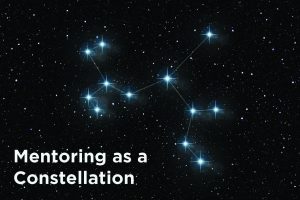 A constellation model, in which students have multiple meaningful relationships with peers, staff and faculty, among others who provide multifaceted support and guidance, acknowledges the complex realities of developmental relationships and the continuum along which mentoring occurs. In this model, mentoring relationships become one of many kinds of relationships that, together, provide a supportive context for learning and development. Because mentoring relationships are sustained, developmental and learner-centered, it is imperative that we scaffold opportunities for students to develop agency to build mentoring relationships throughout their time at Elon, through diverse pathways in the curriculum and co-curriculum. A mentoring constellation framework fits our institutional context and offers opportunities for mentors to connect with and support each other and their mentees.
A constellation model, in which students have multiple meaningful relationships with peers, staff and faculty, among others who provide multifaceted support and guidance, acknowledges the complex realities of developmental relationships and the continuum along which mentoring occurs. In this model, mentoring relationships become one of many kinds of relationships that, together, provide a supportive context for learning and development. Because mentoring relationships are sustained, developmental and learner-centered, it is imperative that we scaffold opportunities for students to develop agency to build mentoring relationships throughout their time at Elon, through diverse pathways in the curriculum and co-curriculum. A mentoring constellation framework fits our institutional context and offers opportunities for mentors to connect with and support each other and their mentees.
Throughout the self-study, a number of compelling questions and emergent tensions surfaced around topics such as academic and student life mentorship; formal and informal mentoring structures; the necessity of training and time/capacity/resources to undertake it; selective, programmatic mentoring and scaling up; students’ need for mentors from marginalized identities; and saturation, capacity, and overloading a few, highly sought and talented mentors. The mentoring initiatives developed out of this self-study must be responsive to emergent contextual challenges, integrated with our work on diversity, equity, and inclusion, and considerate of human and systems capacities that bear the strains of scale, scope and quality.


 A constellation model, in which students have multiple meaningful relationships with peers, staff and faculty, among others who provide multifaceted support and guidance, acknowledges the complex realities of developmental relationships and the continuum along which mentoring occurs. In this model, mentoring relationships become one of many kinds of relationships that, together, provide a supportive context for learning and development. Because mentoring relationships are sustained, developmental and learner-centered, it is imperative that we scaffold opportunities for students to develop agency to build mentoring relationships throughout their time at Elon, through diverse pathways in the curriculum and co-curriculum. A mentoring constellation framework fits our institutional context and offers opportunities for mentors to connect with and support each other and their mentees.
A constellation model, in which students have multiple meaningful relationships with peers, staff and faculty, among others who provide multifaceted support and guidance, acknowledges the complex realities of developmental relationships and the continuum along which mentoring occurs. In this model, mentoring relationships become one of many kinds of relationships that, together, provide a supportive context for learning and development. Because mentoring relationships are sustained, developmental and learner-centered, it is imperative that we scaffold opportunities for students to develop agency to build mentoring relationships throughout their time at Elon, through diverse pathways in the curriculum and co-curriculum. A mentoring constellation framework fits our institutional context and offers opportunities for mentors to connect with and support each other and their mentees.